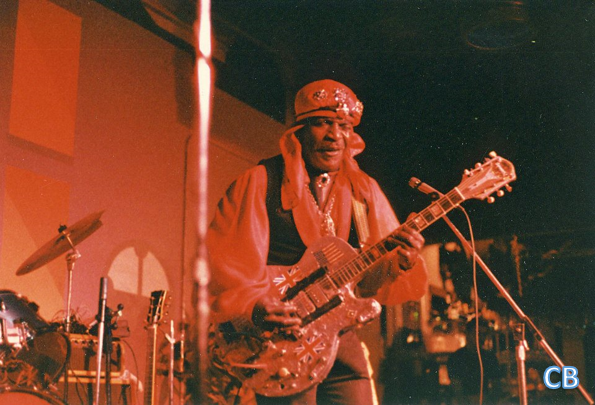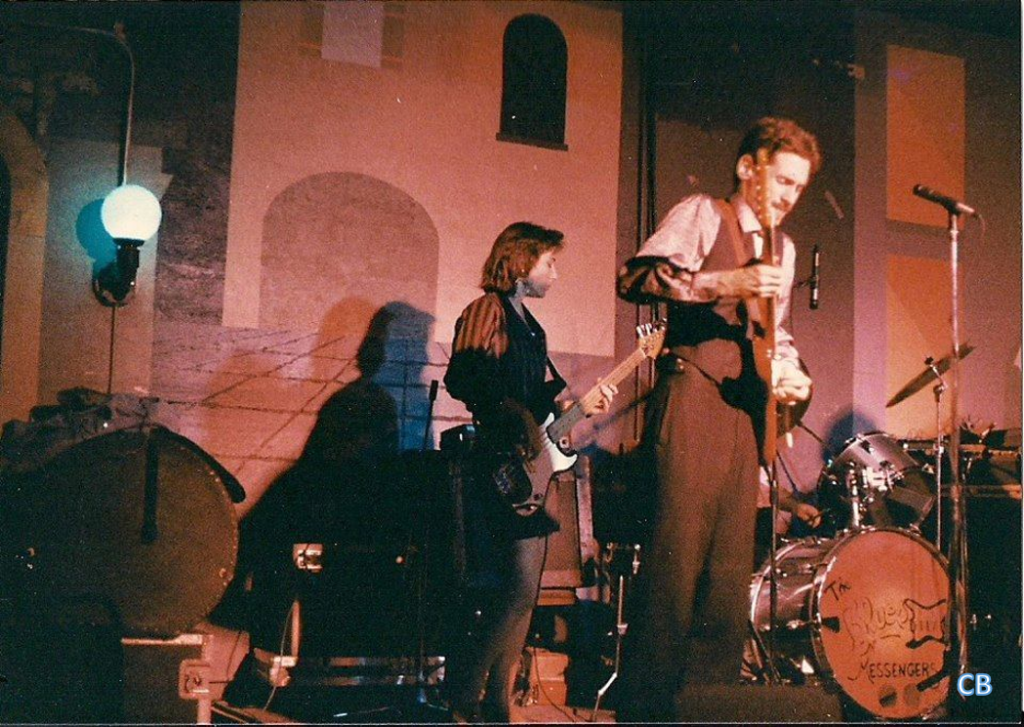Eddie Kirkland: Journeyman Bluesman Who Should’ve Been Better Known And Appreciated
In the late 1980s, on a Wednesday evening at Mishawaka, IN’s Center Street Blues Café, Eddie Kirkland was slated to play. Wednesday night shows at the club were a hit-and-miss proposition, not because the venue didn’t offer excellent blues entertainment, but the crowds could be fickle. One Wednesday evening could see a sizeable audience turn-out, and then a week later, despite who the scheduled blues artist was, a much smaller gathering might occur. As I think back upon this, a couple of reasons come to mind. First, the club offered reggae music on Thursday nights, and this usually caused a tremendously large crowd to show-up, including many students from the various colleges and universities. As an aside, on one of these reggae nights, the club was raided by the Indiana State Excise Police who were tipped-off to underage patrons being in the club, an experience that found this author stuck in the club for hours while it all transpired, despite being in my late 20s. Second, as the club often booked phenomenal blues talent for both Friday and Saturday evenings, many folks decided to keep their hard-earned dollars saved for those shows.
On the Wednesday night in question when Eddie Kirkland and his band, The Blues Messengers, arrived to play the club, the crowd was thin, at best. The club had a cavernous downstairs main floor area, with the stage centrally located against a wall with a cityscape background. The club also had an upstairs mezzanine that offered great views of the floor below. On this particular night, most likely there were no more than a couple dozen blues enthusiasts in the club. However, despite the smaller crowd size, Kirkland and his band put on a blues clinic, with him putting on display his full array of talents, including sweltering guitar work, confident, polished harmonica competencies, and tough vocals. Kirkland’s band was obviously road-tested and had the full confidence of their leader, and their individual and collective efforts were compelling.
Eddie Kirkland came into the world in Kingston, Jamaica. At the time of his birth, his mother was only 11 years of age. At the age of two, Kirkland was living in Alabama, and was under the impression that his birth mother was actually his sister, a fact that was finally disclosed to him while he was in his early 20s.
By the age of 12, Kirkland was already much aware of the blues, as he had been quoted as saying he heard them as field hollers in his Alabama home area. The age of 12 was an important period for Kirkland, as he decided to run away with the Sugar Girls Medicine Show. Roughly one years later, the show terminated, and Kirkland found himself in Indiana. During this time, he decided to return to school for a short period of time.
Having enlisted in the military during WW II, Kirkland found his time in service to his country fraught with racism. Once discharged, he made his way to Detroit, the city where his mother had relocated. He took work in a Ford vehicle plant, and at night, worked upon his guitar playing. Blind Blake, the blues and ragtime singer and guitarist, was Kirkland’s main influence. Kirkland did not play guitar with a pick, rather, using his thumb, and utilized open chords as a component of his style.
Eventually, he began to play house parties, and met John Lee Hooker. This meeting was to change Kirkland’s blues fortunes.
Kirkland’s alliance with Hooker lasted for 13 years, playing second guitar behind, and recording him. Due to Hooker’s idiosyncratic sense of timing, Kirkland was able to refine his blues guitar skills to a great degree. The Hooker alliance lasted until 1962.
During his time with Hooker, Kirkland had his own opportunities to record, doing so with King Records in 1953, and with Fortune Records in 1958.
After departing Hooker, Kirkland move to Macon, GA. This period found him as a guitarist in Otis Redding’s band, along with being Redding’s road manager. In 1962, Kirkland released an album on Prestige Records with the King Curtis Band. 1963 saw Kirkland release a Volt Records single entitled “The Hawg” under the name of Eddie Kirk, a tune that gained him wide notoriety.
Unfortunately for Kirkland, despite the success of “The Hawg” the Stax/Volt record conglomeration also had Rufus Thomas under its umbrella, and dispirited by the focus on Thomas and the music industry, in general, plus his shortage of education, Kirkland retreated to working as a vehicle mechanic to support his family.
In 1970, Peter Lowry, the founder of Trix Records, was determined to bring Kirkland back to the blues, and recorded two albums on him. The mid-1970s also provided another unique opportunity for Kirkland. It was during this period that he met and made friends with Foghat, the British blues-rock band. By this time, Kirkland was living in the Hudson Valley region of New York, a locale he would call home for 12 years. Kirkland, because of his affiliation with Foghat, would appear on the highly-successful late-night rock music show, “Don Kirshner’s Rock Concert”, with Foghat, along with famed bluesmen Muddy Waters and David “Honeyboy” Edwards.
1973 afforded yet another break for Kirkland, as he played the Ann Arbor Blues and Jazz Festival, on a bill that included other notable Detroit blues greats, including Boogie Woogie Red, Bobo Jenkins, and Baby Boy Warren, among others.
This period also saw Kirkland tour extensively, both in the U.S. and abroad.
In 1980, Kirkland record for the JSP Records label, and in 1983, he recorded for Pulsar.
In the 1990s, Kirkland took Randy Labbe as his manager and booking representative, a relationship that provided many touring prospects, and three released albums on Labbe’s Deluge Records label.
Kirkland went on to record for Telarc Records in 1997, and for JSP Records in 1999. His final recording contribution was with Foghat when he provided two songs for the band’s 2010 release Last Train Home.
By now well into his late 80s, Kirkland was continuing to extensively tour, domestically and abroad, and still driving himself to shows stateside. He often performed with the Finnish outfit, the Wentus Blues Band.
In 2011, Kirkland died as a result of a motor vehicle crash in FL, having played the night before.
For one night in the late 1980s, those of us who witnessed Eddie Kirkland in Mishawaka, IN, were transfixed by his sheer power and passion for the blues. We didn’t know it at the time, but we were witnessing blues royalty. In retrospect, I am glad we didn’t know, because perhaps it may have changed our expectations. As it was, it was a blues performance that has remained one of the best those of us in attendance ever saw.


